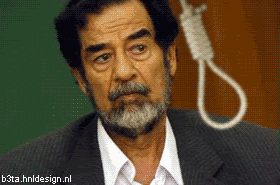What is The Face of Islam?
The Wordsmith from Nantucket has an excellent piece on this subject.
The Wordsmith helps redefine some of the players in the Global War on Terror here:
Language has the power to define and to shape perception. It is a weapon in itself. While visiting Amy Proctor's blog, she wrote about the value in distinguishing the difference between "jihad" and "hirabah", and to help make that distinction mainstream.
Amy defines the two terms this way:
Amir Taheri asks "What do Muslims Think?:
The Wordsmith helps redefine some of the players in the Global War on Terror here:
Language has the power to define and to shape perception. It is a weapon in itself. While visiting Amy Proctor's blog, she wrote about the value in distinguishing the difference between "jihad" and "hirabah", and to help make that distinction mainstream.
- we do a disservice [to] the war on terrorism when we refer to acts of terrorism as Jihad. It is not and in order to isolate the terrorists, we need to refer to what it is: Hirabah.
Amy defines the two terms this way:
- Jihad means to make an effort to overcome difficulty or to struggle. It includes an internal or personal, social and institutional struggle for justice and against oppression and sin. Jihad can not be used to force people to convert or kill non-Muslims. This is contrary to Islamic law.
- Hirabah on the other hand is rebellion and terrorism, considered heresy within Islam. Acts of hirabah are capital crimes in Islam. It contains the principle of Jihad but carries out acts of “persuasion” to meet its objective.
The American Interest has several takes on this same question:
Amir Taheri asks "What do Muslims Think?:
Most do agree, however, that the question is important, for the answer ought to tell us how to fashion the political aspects of the global War on Terror—the struggle for “hearts and minds”, as it is commonly and more softly called. If most of the world’s 1.3 billion Muslims oppose radical views, then U.S. (and Western) policy could usefully help organize, mobilize and in other ways support majority moderate Muslim views against minority radical ones. There would be a robust future for public diplomacy and little worry about a clash of civilizations. The short-term risks of destabilizing authoritarian Arab allies in an effort to open up political spaces within their borders, too, could be borne confidently. On the other hand, to the extent that Muslim societies have become radicalized in recent years and if still further radicalization is to be expected, then public diplomacy will not be able to accomplish much, a civilizational clash looms, and cooperation with less-than-democratic regional allies becomes a more attractive tactic.
Just a dozen years ago, virtually no one debated this question. Despite the radicalizing influence of the Iranian Revolution and the Wahhabi proselytizing of an inexhaustibly wealthy Saudi Arabia, virtually all knowledgeable observers would have dismissed the possibility that radicals would ever make up a majority, or anything near it, within the Muslim world. Now there is a plausible argument otherwise. Radicalization has advanced rapidly, runs the argument, through a combination of factors: the frustrations of living under corrupt and dysfunctional governments that have failed to congeal a focus of loyalty other than that of tribe and sect; greater literacy and urbanization, which privilege higher, formalized standards of piety over the traditional folk Islam of the countryside; reaction against the alien indignities of Western materialism, accelerated by the growing scope of post-Cold War globalization; the integration of Muslim political consciousness (and grievances) worldwide thanks to the information revolution; and an aggressive post-9/11 U.S. foreign policy that has fueled nativist reactions against Westernization on a massive scale.
Meanwhile, Philip E. Auerswald believes the Middle East is becoming obsolete:
The Middle East, as virtually everyone knows, is the repository of half of the world’s proven oil reserves, the locus of vital shipping lanes and the heartland of Islamic fundamentalist terrorism. Events there directly affect the U.S. economy and its national security, which is why we almost universally view this region as one of paramount importance. That the U.S. military presence has declined since the end of the Cold War in every part of the world except this one is a natural reflection of the region’s strategic centrality. This line of argument is so familiar that it is almost impossible to conceive of its being mistaken. Yet it is.
As the 21st century unfolds, the Middle East (leaving Israel aside for the moment) will matter less and less to the United States and to most of the rest of the world. Only when we recognize this fact will we be able to forge a coherent and effective foreign policy in the Middle East and elsewhere. As a consequence, we have much more to fear from a U.S. posture that strives to accomplish too much in the region than we do from one that strives to accomplish too little.
So, gentle readers, in the end we, as Westerners and predominantly Christian, are faced with several questions as we proceed in the GWOT:
- Is Islam an inherently-violent religion that seeks global domination at all costs?
- Is Islam a naturally peaceful religion being held hostage by a minority of zealots, using Western ideologies to foment anger against non-Muslims?
- Can democracy trump thousands of years of subjugation in the name of one religion?


























1 Comments:
Thanks for the link up and the article. Very interesting questions, for which I am still searching for the answers.
I have been planning a post for some time now, regarding Ron Paul's assertion that U.S. foreign policy is the cause. Still organizing my thoughts and links.
Post a Comment
<< Home